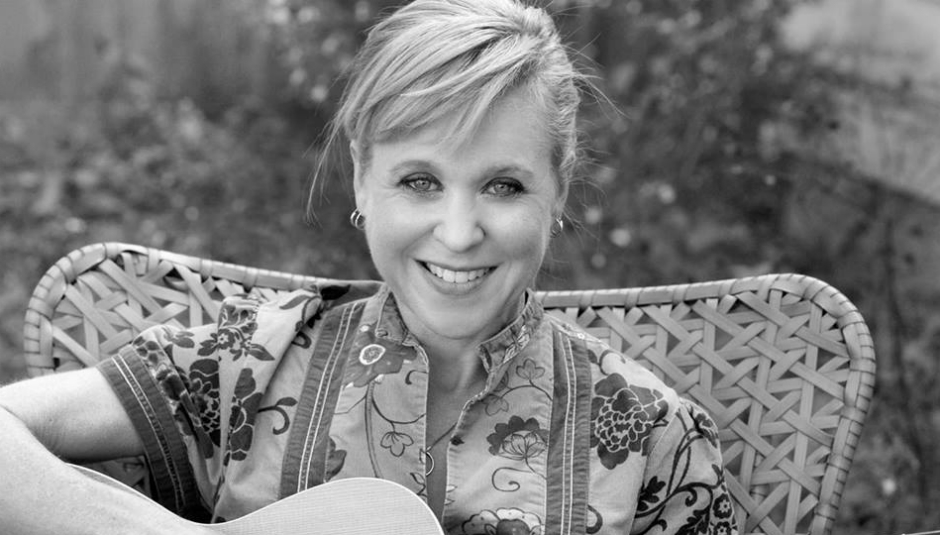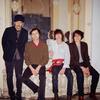Kristin Hersh has been making music for the best part of four decades, having formed her first band Throwing Muses at the age of fourteen. They eventually signed to then-fledgling independent label 4AD, becoming the first American band to do so, releasing a number of critically acclaimed records in the process.
While Throwing Muses have since gone on to release nine albums and are currently in the process of recording a tenth, Hersh embarked on a solo career simultaneously that has also produced ten albums. While 1994's debut Hips And Makers remains her most commercially successful release to date having broken the UK top ten, every subsequent record has yielded something new and enriching.
Last year's excellent Possible Dust Clouds was heralded by some critics as her finest body of work to date. An album that saw her reunited with former Throwing Muses bass player Fred Abong and drummer/producer Rob Ahlers, with whom she formed 50 Foot Wave in 2003, Possible Dust Clouds is an urgent and occasionally visceral ride that bristles with energy and intensity.
Currently in the UK touring the album, DiS caught up with Hersh, Abong and Ahlers prior to their sold-out show at Nottingham's Glee Club.
DiS: How's the tour gone so far? What's been your highlight?
Kristin Hersh: It's gone really well.
Rob Ahlers: Probably the first show where everything came together for me so that would be the fourth one of the tour which was the second night in London. We played at Bush Hall which is a lovely venue. Also, Glasgow was another highlight because it was so in your face. They were a very wild crowd! They've all been wonderful in their own way. The church gig in Salford was uniquely interesting for us. We learned how to play in a large room with lots of reverb and the feeling we got from that was magic.
You've played shows all over the world for a number of years now. Are there any countries you particularly look forward to visiting or audiences that stand out above the rest?
KH: I liked Australia because we were told beforehand they would hate us! They said people will just stand and stare at you, but as it happens they just stand and stare at hyped bands who can't play. So we were like, "Bring it the fuck on!" and for the first three songs, the crowd stood and stared then afterwards went ape shit. They are clued up without buying the hype, which is perfect. Ireland can be a little bit like that too. It's the same sort of distance from other cultures. They keep up but don't take everything too seriously.
Throwing Muses were one of the first bands I saw at Trent Polytechnic back in 1989 with The Sundays. You've played Nottingham on numerous occasions since, both with your band and as a solo artist. Does the city have any special memories for you?
KH: I remember playing here a few years ago with Vic (Chesnutt) and he got a Robin Hood hat which he wore for the rest of the tour. By the rest of the tour I mean a year and a half! He thought it was a Peter Pan hat which he found in the Robin Hood museum. It was really soggy.
With such a vast catalogue of work to choose from, how do you manage to condense it all into an hour-long setlist?
KH: I thought I had to be nice to Fred (Abong) and give him predictable chord progressions but he was instantly bored so I think we could have chosen a different setlist. But seriously, this set works really well. We're playing half of the new record then a couple of songs from 50 Foot Wave and Throwing Muses. Fred has his own catalogue as well so he's playing a solo set before all three of us go on together.
With your solo material alone it must be difficult deciding what to leave out? Everyone probably has their own favourite from the ten you've made so far.
KH: My IQ's pretty low so I can't remember most of them!
RA: Part of the reason we chose this setlist was because of the sound of the latest album. It's quite a lo-fi, heavy record so it was a case of choosing songs that could fit in around that. But we don't argue about it. It works really well.
Possible Dust Clouds is the first record you've worked on with Rob and Fred outside of Fifty Foot Wave and Throwing Muses. Do you see yourselves collaborating more often in the future?
RA: Why not? I hope so. It wasn't meant to be a solo record for Kristin, I know that. It started in a different vein. It almost became a record without vocals at all. They were all instrumentals in the very beginning. It was just a Dropbox project to start with, where we were sending each other groovy little snippets of music back and forth over the internet. Then it evolved into Possible Dust Clouds.
KH: Chris Brady from Pond sang backing vocals on it. They opened for Throwing Muses a long time ago. I'm pretty sure they played one of our Nottingham dates actually? He's one of my favourite singers and did such a good job on this. The songs just started to happen gradually.
RA: I'd get an email with a song taken in a different direction, then another, and another. So it was nice to see the record build up from these instrumentals to what it eventually became.
KH: So we recorded the album in San Francisco and Rob engineered it.
RA: Chris (Brady) came down from Portland to play some bass.
KH: So we had that but it just sounded like a band. Whereas I wanted it to sound like a fucked up band, so the editing is really out of control, and the production is extremely guitar heavy and lo-fi. Rob is a very good engineer and I needed to make sure it didn't sound so good!
It's a very visceral record, one that actually feels like a punk rock album. With the tone of some of the lyrics in songs like 'Gin' and 'Tulum' coupled with the political climate around you, was that your intention?
KH: Rob captured 'Gin' in the middle spectrum and it is quite a muscular, athletic song. But then in a higher sonic spectrum with overdubs and vocals it all needed to be out of time and out of tune so we had to move the drums around and if I still couldn't fuck it up enough I would play dulcimer really badly and really wrong. Then I'd add atonal drums to fuck it up even more. The songs I wrote initially were still there. It just needed something more interesting in the high and lows to bring them to life.
Which songs on Possible Dust Clouds were written first?
Fred Abong: There were eight solid ones already there then we added a couple more. The oldest ones date back to around 2012, 2013.
KH: We're playing the oldest ones on this tour. 'LAX', 'Loud Mouth', 'No Shade In Shadow', 'Halfway Home', 'Tulum' and 'Breathe In'.
You've already put out 'LAX' and 'Loud Mouth' as singles from the album. Will there be any more?
KH: The next single is 'Breathe In' because they're making a video for it. It was Fire who chose the singles. We didn't.
This is your first album on Fire Records. How did you become involved with the label?
KH: They just stepped out of the wings and said we know you're listener supportive, but would you like to engage because this is what we do. Being listener supportive means I had to earmark plans production, distribution, promotion and so forth. They took all that and brought it in-house which not only saves money for more sessions and means 50 Foot Wave can continue to work. But also being in-house brings a more unified approach to finding the listeners. I am quite clear about marketing but I had to wait a long time for the paradigm to shift in order to see who the other people were and whether they were focused on that. Bringing music to the listeners, that equation has to be solved rather than trying to fool them with limited edition singles and stupid fashion statements.
Fire have an incredible back catalogue of established artists so their track record is already distinguished among the record buying public.
KH: That's true actually. There used to be a lot of labels like them when we first started playing music. People like Flying Nun and Creation. You used to be able to reliably cast your dollar vote on pretty much everything they released. Then when the industry started to fall apart that disintegrated pretty much, so it's great that some of these labels are back. Fire have an ear towards - not necessarily current material as I think music should be timeless - being able to keep up. They don't treat me like a heritage artist.
I don't see how anyone could regard you as a heritage artist as your output has been quite prolific for over thirty years now.
KH: A lot of people think I stopped when I fell off the radar, which was when Warner Brothers stopped working with us. But I don't really care that much either. I love what we do and to do it is the reward. But if people are still interested in my latest record it means we can tour, so then it becomes a much more sustainable venture. We could play in a garage to just a handful of people - which we have - and still get just as much from it. I haven't written any new songs for a couple of years. Mainly because I used to hear them in my head but I haven't heard them recently.
You mentioned 50 Foot Wave being able to continue. What about Throwing Muses? There hasn't been a Throwing Muses record since Purgatory/Paradise in 2013. Is there anything in the pipeline there?
KH: They're in the studio right now but only my parts are down so far, which is not normally how you would record. So if they don't come back to the studio who knows when it will happen! I've been laying down tracks for a while, but I have to play to a click otherwise the production becomes top heavy. So the way around that is for my bandmates to then play along to that. You can't really tell that is happening because it sounds live, which is what feeds Possible Dust Clouds' energy. Not so much as a live recording but more as a live experience. So I'm trying to do that to the Muses again. I did it with the last album Purgatory/Paradise, and the basics are there already. Rhythm guitar and vocals, then I'll see what Dave (Narcizo) does and add on to that. I play some of the bass, just because I need to. If it doesn't come together we'll have Rob come in and make it noisy.
You played the Southbank Centre in London last year as part of Robert Smith's Meltdown Festival. How did that come about?
KH: Honestly? I don't know! It's a beautiful venue and my cellist was there. We'd probably have paid more attention if we cared who was listening but we don't.
You've seen a lot of changes within the music industry over the past three decades. Do you think music television or even radio are as important now to an artist like yourself? The music press too?
KH: I don't care! I want to find the good people. I want to find the good radio stations that are struggling to survive or the record stores that might close if artists like ourselves aren't there playing in-stores. Because that will be in our sphere to reach listeners. All of us together. We have to take the music business out of the recording industry. That's where the paradigm shifted initially, so if the press doesn't give us attention, I don't care. If they're not going to get us money, I don't care. They're going to get us people. I don't need to find that many ears. I just need to find people that like what we do. We've never cared about becoming big. People in bands shouldn't worry about being bigger. People who are willing to suck to succeed in the desperation of survival. Those are not musicians. Musicians will never suck because they don't have that attitude. It's all over the business. There aren't many real musicians left in the business, because we die. We wander off. That would be OK if we didn't just fill people's ears with candy instead of food! You can find that in every discipline so I don't take it too personally anymore. Fashion makes people money so they go after the shallow audience. We don't want them anyway.
There are two major talking points in the UK music industry right now. One is the Keychange initiative which is looking to redress the gender imbalance on festival bills. As a female artist what's your take on it? Are women being given more opportunities now then when you first started out?
KH: White male privilege is real, make no mistake about that. So are some of the women willing to kiss up to it, and I wouldn't want to see that rewarded.
RA: There needs to be a happy medium. If there are more women in bands being given the opportunity to play then, of course, that's cool. I want to see that. But at the same time, I don't know what it means in terms of motivation for wanting to do it? Does that mean a lot of mediocre bands will be added to bills? I don't know. If promoters are just using that as a guide then it becomes a token gesture which ultimately won't work.
KH: If you tell half the population that the other half has the resources and you have to kiss up to get them, some of them are going to do it. A lot of them are going to do it, and that's what happened with a lot of women. So if you start to backpedal on that maybe there will be more women who are less willing to flirt in music.
RA: I think everyone should enjoy what we do but it shouldn't just be a case of welcome aboard, here's your ticket. You don't have to be good or whatever. I think there's an abundance of really good artists out there that don't get a lot of recognition so hopefully, those are the ones that will get the opportunities now. Those that want a life in music. That want a career in music forever. They're doing it for their lives and no other reason.
KH: Whereas the ones who are doing it for fashion will hopefully disappear. There are a lot of men who do that too. I never got called a woman because I didn't do any of this stupid shit.
The other is the stigma around mental health in the music industry, and how those affected can be given the right support. Have perceptions changed in terms of mental health awareness?
KH: I can relate to a lot of this, particularly from my time with Warner Brothers because they wouldn't let me release enough records. They just wanted to keep us down. They literally took our songs off the radio. They said we only got signed so they could sign other bands who liked us. To buy into the pressure of their version of success - which is bullshit. I don't see those pressures as being real but as a shy person, I liked having someone to handle things like promotion. Now as a musician we have to handle everything and it's tough.
What advice would you give to a new band just starting out?
KH: Don't suck! That's it. Even if no one ever hears you at least you don't fucking suck. It was played out in no uncertain terms. You sucked for attention. Who the hell wants that? Everybody looking at you when you're embarrassing yourself? That was never interesting to me.
Are there any new artists you'd recommend for Drowned In Sound and its readers to check out? Any you see parallels with yourself? Acts that could have a similar longevity 20-30 years down the line even?
KH: I just see moments. I don't see longevity or anything like that. I like Tomorrows Tulips. They care but also they don't care if you know what I mean. People who stay small are winners right now. I'm not saying people's music should remain unheard but I think there's something to be said for bands that have no interest whatsoever in becoming famous. I can walk down any street and hear music coming out of the windows. Bands playing tiny bars and rehearsal spaces. Not that tourist bullshit, but music that is not meant to be sold. It goes into the air. I think the end game is everybody plays, and if we all become musically literate and want to share then let us share. I remember we played a show in Buffalo and we thought no one would come, then it suddenly filled up at the last minute and they were all people in bands who were fans of each other. Mixed up and incestuous bands that knew each other's material who all went to practice then decided to come and see us after. Nobody wanted to be signed or do anything other than play music.
Possible Dust Clouds is out now via Fire Records. For more information on Kristin Hersh, including forthcoming tour dates, please visit her official website.






















